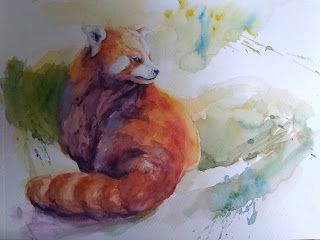Albert Camus (1913-1960)
Resistance, Rebellion and Death (1961). NY: Knopf.
My inexplicable affection toward Camus reoccurred while reading Darkness Invisible. Death seems a reoccurring theme throughout his career. Understandably he was born one year before the WW I, lost his father during the war and fought under the German occupation. Thus, as McCarthy (1988) suggests, absurdity becomes a resolution in his view with religious first of all--it is man's capacity to be aware of the divine--and political connotations. Meursault's happiness is after all his domination on his body and fate. Within this context, the dividing line between murder and suicide becomes blurred. Here is some quotes from his essays or speeches.
Man's greatness lies in his decision to be stronger than his condition--The Night of Truth, 8/25/1944, around the time Paris was taken back from Nazis.
When that intelligence is snuffed out, the black night of dictatorship begins--Defense of Intelligence, 3/15/1945, against the new French government's vehement of intelligence and for the intelligence backed by courage under the occupation.
Freedom is the concern of the oppressed and her natural protectors have always come from among the oppressed.
Forceful intellectuals announced to the worker that bread alone interested him rather than freedom, as if the worker didn't know that his bread depends in part on his freedom.
A single value is constantly outraged or prostituted--freedom--and then we notice that everywhere, together with freedom, justice is also profaned--Bread and Freedom, 5/10/1953, speech.
Freedom is refused not because of its privileges but because of its exhausting tasks--speech of homage to President Eduardo Santos, driven out of Columbia by the dictatorship.
The aim of art, the aim of a life can only be to increase the sum of freedom and responsibility to be found in every man and in the world.
For the man of today there is a sort of solitude, which is certainly the harshest thing in our era forces upon us...Moreover, I have always thought that the maximum danger implied the maximum hope. (in response to a question about ambivalent values in his work, such as pessimism and confidence given to spirit rather than man, to nature rather than the universe, etc.)--Wager of Our Generation. An interview in Demain, issue of 24-30 October 1957.
Wisdom has never declined so much as when it involved no risks and belonged exclusively to a few humanists buried in libraries. But today, when at last it has to face real angers, there is a chance that it may again stand up and be respected--Create Dangerously. Lecture in December 1957.
My inexplicable affection toward Camus reoccurred while reading Darkness Invisible. Death seems a reoccurring theme throughout his career. Understandably he was born one year before the WW I, lost his father during the war and fought under the German occupation. Thus, as McCarthy (1988) suggests, absurdity becomes a resolution in his view with religious first of all--it is man's capacity to be aware of the divine--and political connotations. Meursault's happiness is after all his domination on his body and fate. Within this context, the dividing line between murder and suicide becomes blurred. Here is some quotes from his essays or speeches.
Man's greatness lies in his decision to be stronger than his condition--The Night of Truth, 8/25/1944, around the time Paris was taken back from Nazis.
When that intelligence is snuffed out, the black night of dictatorship begins--Defense of Intelligence, 3/15/1945, against the new French government's vehement of intelligence and for the intelligence backed by courage under the occupation.
Freedom is the concern of the oppressed and her natural protectors have always come from among the oppressed.
Forceful intellectuals announced to the worker that bread alone interested him rather than freedom, as if the worker didn't know that his bread depends in part on his freedom.
A single value is constantly outraged or prostituted--freedom--and then we notice that everywhere, together with freedom, justice is also profaned--Bread and Freedom, 5/10/1953, speech.
Freedom is refused not because of its privileges but because of its exhausting tasks--speech of homage to President Eduardo Santos, driven out of Columbia by the dictatorship.
The aim of art, the aim of a life can only be to increase the sum of freedom and responsibility to be found in every man and in the world.
For the man of today there is a sort of solitude, which is certainly the harshest thing in our era forces upon us...Moreover, I have always thought that the maximum danger implied the maximum hope. (in response to a question about ambivalent values in his work, such as pessimism and confidence given to spirit rather than man, to nature rather than the universe, etc.)--Wager of Our Generation. An interview in Demain, issue of 24-30 October 1957.
Wisdom has never declined so much as when it involved no risks and belonged exclusively to a few humanists buried in libraries. But today, when at last it has to face real angers, there is a chance that it may again stand up and be respected--Create Dangerously. Lecture in December 1957.


Comments